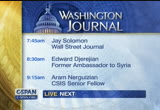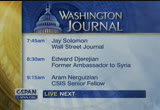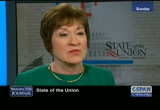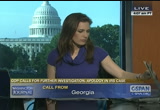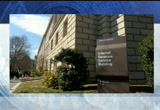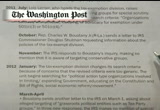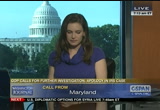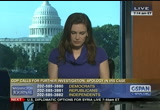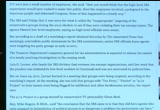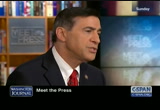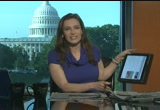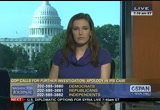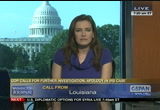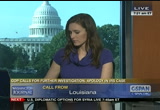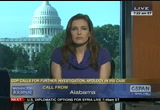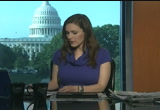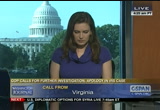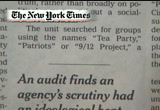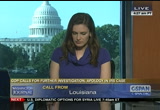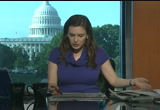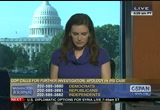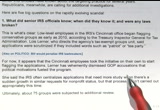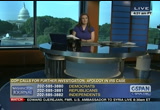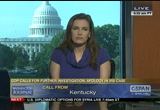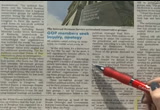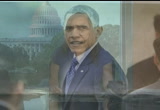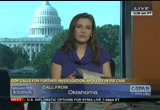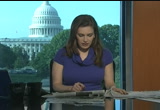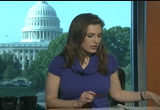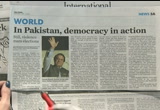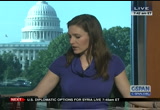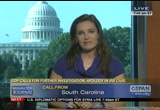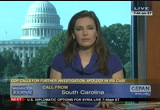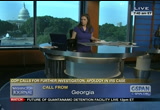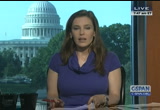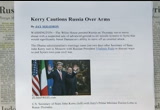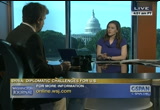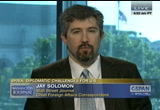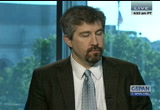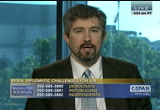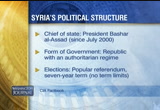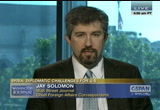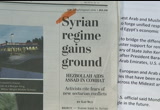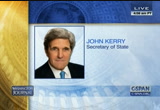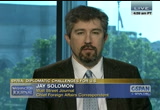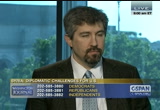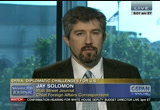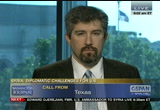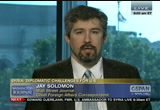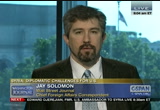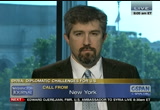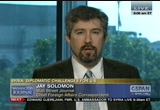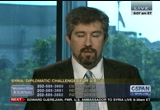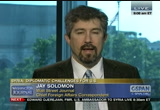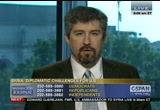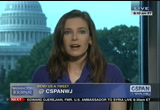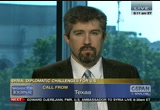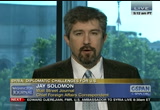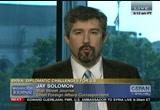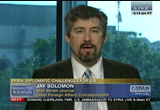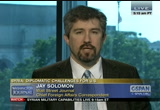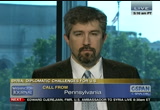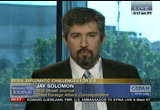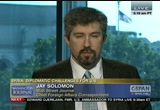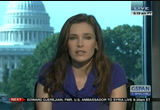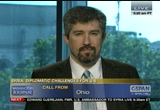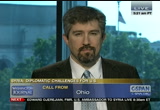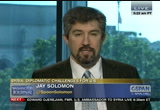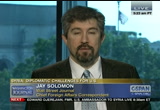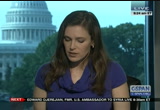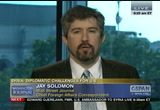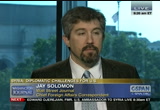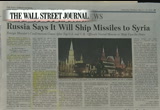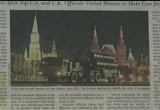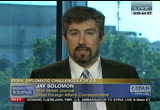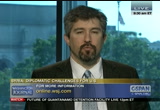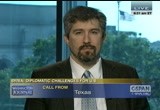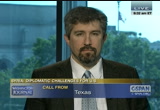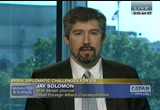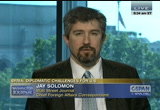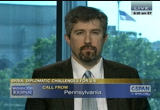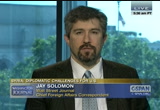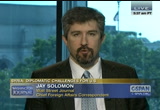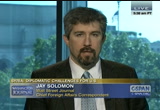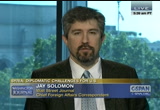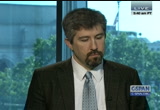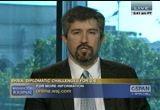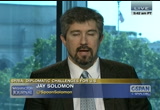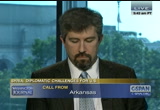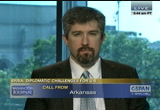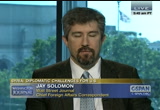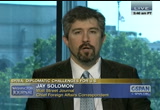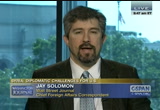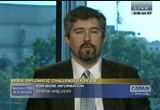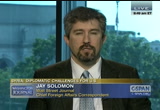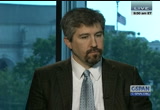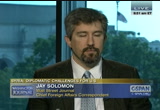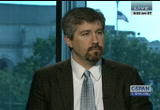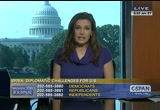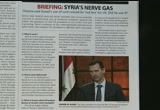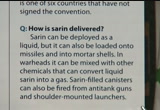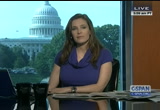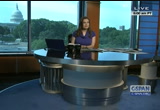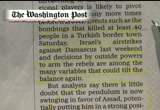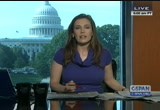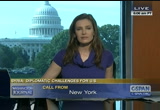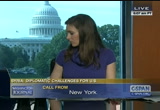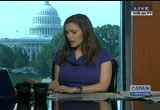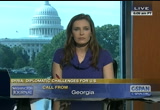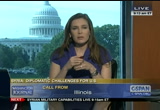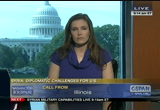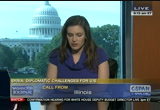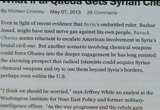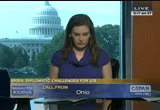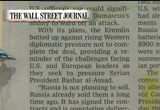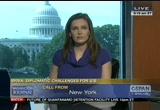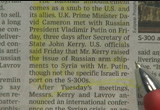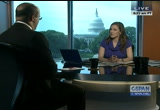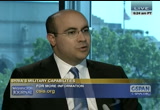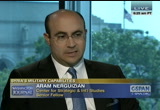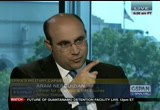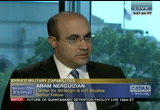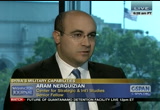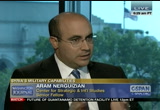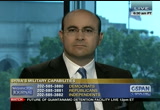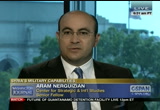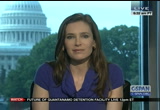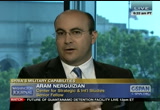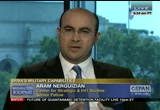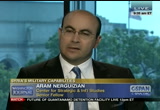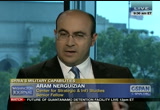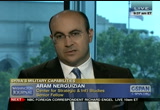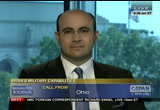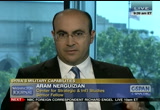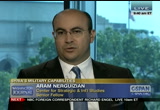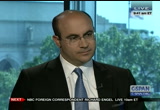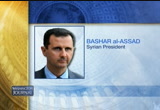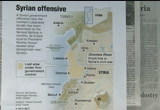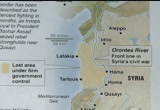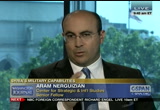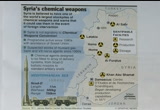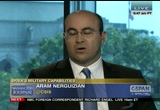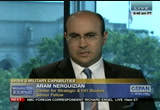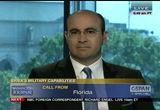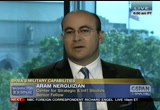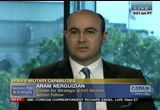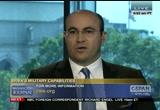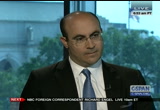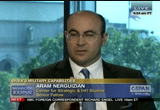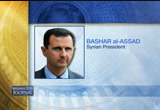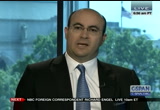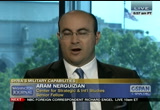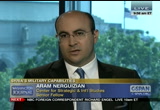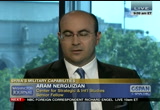tv Washington Journal CSPAN May 13, 2013 7:00am-10:01am EDT
7:00 am
♪ host: good morning, welcome to "washington journal." the house and senate return to washington this week and members of congress joined the sunday talk shows yesterday to react to a host of issues, including last september's benghazi attack, the issue in syria, which we will talk about later this morning, and that the irs targeted the tea party groups for scrutiny. we would like to hear your thoughts on the irs case.
7:01 am
7:02 am
collins was on cnn. let's listen to what she has to say. [video club] >> this contributes to the profound distrust that the american people have in government. it is chilling that the irs was singling out conservative groups for extra review. it is very disappointing that the president has not personally condemned this and spoken out. his spokesman has said it should be investigated, but the president needs to make court -- crystal clear that this is totally unacceptable in america. host: that was senator susan collins of maine talking about the irs. inside, the irs case is fodder for partisan warfare.
7:03 am
that it targeted conservative groups for additional scrutiny during the 2012 election, it could jeopardize efforts for the elections. host: we have also seen this headline on the front pages of other newspapers. "the washington post," we are finding out more information about what the report contains, but they obtained the documents from a congressional aide with knowledge of the finding.
7:04 am
host: inside of "to washington .ost," we see more information a detail of the scrutiny focused, and you can see here the findings. a timeline for back in 2010. the irs tax-exempt division began targeting applicants with names that contained tea party, patriot, and other political sounding titles, as well as 900
7:05 am
-- 9/12, a group founded by glenn beck, a political conservative commentator. we will talk more about this this morning, but if you would like to join the conversation, here are the numbers. for democrats, 202-585-3880. for republicans, 202-585-3881. for independents, 202-585-3882. and if you are outside the united states, 202-585-3883. our first caller this morning is joe, georgia, hello. caller: i am fine. this is really upsetting. i am a member of the tea party and i have worked hard for different congressman. great taxpayer champions. the tea party has been behind them. we have a guy who has been running for governor and he will have a lot of tea party support for us. this really upsets me. i think it should definitely be
7:06 am
a big investigation. are targeting conservative groups and it really bothers me i elect candidates like this and then we come under this kind of unfair scrutiny. you do not see that happening on the left. why do you think the irs is picking on conservative groups and not a liberal groups? that is very have served me. i know that a lot of my friends in the tea party -- i will tell you what is it slowing too to do, they are so upset i think you will see huge republican wins. this has made the tea party members fired up. i am looking for a huge republican wins. work andt is going to it needs to be investigated. host: we have heard this over the last couple of days.
7:07 am
overseas tax-exempt groups have apologized and said that the cases were initiated by low- level workers and were not motivated by political bias. what do you make of that? think it has to be more than that. some people should lose their jobs over this, certainly. best -- do not know this, but it could be the higher levels. it could be the administration going after conservative groups. i know that they are scared that 2014 will be a huge win for republicans, so this is scary and it needs to be investigated at the highest level. it is very scary but it has fired me up and i will work hard for more concern. i think that what they have done is energized the tea party. host: michael, democratic line,
7:08 am
ohio. the irs forrked for about 30 years. investigatedlways tax-exempt organizations. when you apply for tax-exempt organization, especially 501 c3 or 4, you fill out a form, a very extensive form and it requires a lot of information. it takes time to review this. they are reviewed thoroughly. they are not scrutinized. they review all of these applications, not just the ones for the tea party, patriots, or anything that has been on tv right now. they are reviewed thoroughly because they are very important.
7:09 am
is what of our country the internal revenue service provides in taxes and collections and exams, everything. so, all of these tax-exempt organizations are thoroughly reviewed because, keep in mind, they are not paying taxes. host: what do you make of this headline? on conservatives, gives gop issue to seize on." that is from "the new york times." this one from "the wall street journal," "wider problems found with irs scrutiny of conservatives." news stories are detail in this specific targetting with groups using particular keywords. what do you think? caller: it is all political. the gop has something they can
7:10 am
stick their fingers into right now, like benghazi. the same thing. they do not like president obama. let out. host: edward, miami, florida, independent, what do you think? caller: thank you for taking my call. was it not a tea party member who flew an airplane into a tea begin to an irs building not long ago? when you consider their behavior during the health-care debate, of course they need extra scrutiny. that is my opinion. host: this is from dan -- host: again, here is the front page of "usa today." republicans are demanding that the president apologize himself. jerry, hillside, republican. caller: hello. good morning. ,he thing about this whole case
7:11 am
what group is that looking into this? i forget. somebody is looking at it. this is decided in 2010. this is not a subject that just started. they came to fruition. and then they were doing this to the teeth party and every other group that has anything on the right. they did not do this to anyone on the left. no liberals, nothing. just everyone in the two-party. they were talking about this on that show. bob burns talked about this on the other channel. there is some big stuff coming out of this. that is all i have to say. thank you. host: jerry, you mentioned 2010. we will look at this time line more in depth from "to the washington post." back in 2011 they raised
7:12 am
concerns over special scrutiny. decisions switched to more generics search criteria. organizations involved in political lobbying advocacy exemption under different codes, and then in 2011 a republican commissioner sent a letter requesting information about the policies of the tax- exempt division. a month later the irs responded to the inquiry, making no mention that they were aware cut targeting conservative groups. the land, utah, democratic line. utah, democratic line. caller: if it were the other side, the other groups that are lobbying out of that arm right now, they would tell everyone to sit down and shut up. they act like they want to be
7:13 am
left alone. why should they be left alone? that is my question. host: joseph rights in and says that the irs is wrong. loess, republican caller, welcome. caller: this is horrible what they are doing, the irs targeting the conservative groups. i mean, i am a republican. it almost makes me want to change my affiliation. what are they going to do to the republicans? this president -- i am a little nervous, i am sorry, but this president, it is like killing represents half this country and does not care about the rest of us. host: well, what do you want to see happen now? we did hear the president comment on this along with jay
7:14 am
carney on friday. what do you want to hear next from the white house? caller: i want to hear the president come out and talk about this. he has jay carney come out and do his dirty work. he needs to come out and tell the american people. it is just like this benghazi situation. it is like he disappears. when he took down osama bin laden, we had minute to minute coverage on that. but with benghazi we had none. the irs, he has disappeared again. it is just ridiculous that he is just so -- i do not even though, he just hide. host: don, democratic line, a lawyer. caller: i looked at several articles about this, quite a few, and i think it is important to mention that the head of the irs at the time of the election in 2012 was a bush appointee,
7:15 am
still. host: talking about douglas shulman. caller: the reason that that is important, the same people criticizing this are at the same time saying that when they are saying that this was decided in cincinnati, that is ridiculous, it goes to the top, but at the same time the guy a -- the guy in charge of the irs that the time was a bush appointee. they need to understand. if it goes up to the top it goes to someone who was appointed by president bush. host: we saw some news from the associated press following this story, tracking our topic this morning, republicans said yesterday that the irs heightened scrutiny of political groups was "schilling, further eroding public trust in government. lawmakers said that president obama should personally apologize. challenging low-level workers in
7:16 am
the tax organization. the irs said on friday that it was sorry for targeting conservative groups, but according to a draft of a watchdog report brought in by the associated press, a senior irs officials knew that ought agents were targeting them as early as 2011 and the special general for tax administration is expected to release the results of a nearly yearlong investigation this week." we heard this talk about yesterday by congressman beryl eisa, chairman of the house oversight government reform committee, appearing on "meet the press." let's listen. [video clip] conservativesof using keywords. this is something that you have to institute change just to make sure it does not happen again.
7:17 am
the has to be accountability for the people who did it and until a few days ago there has to be accountability for the people telling lies about it being done. one of the most offensive parts is that my committee, jim jordan and i in -- instigated this investigation. before their report comes to the public or congress as required by law, it is leaked by the irs to try to spin the output. honesta culpa is not an one. the honest one is we should see the ig report and, like the ambassador said on the changes, which we agree with, let's see what this changes need to be to make sure that this does that happen again. host: to talk to us about the irs case, here are the numbers. for democrats, 202-585-3880. for republicans, 202-585-3881. for independents, 202-585-3882.
7:18 am
if you are outside the u.s., 202-585-3883. our next caller is gone, illinois, hello. caller tell you already talked to me. host: -- caller: you already talked to me. host: sorry, any final thoughts since you get a second round? caller: just that that that is accurate, he was a bush appointee. host: when you hear congressman isa just out, reflect on his comments. caller: that investigation is warranted. i think that the targeting of is -- it will it turn out that these organizations that are supposed to be non-political -- i mean, they can do some political work, but their primary job is supposed to be social welfare.
7:19 am
i think it is likely that they might find that most of these groups with patriot and tea party in their names, i know some people who work in organizations like this, they laugh about it, they say that these things are political organizations primarily. i think an investigation might find that these organizations are primarily political and this investigation could backfire on them. host: grace, long beach, new york, independent line. caller: hello. this is something that has been going on and on and on. it has not just started under obama. i remember when they took and attacked julian barnes under bush. so, this is nothing new. host: this is the comment from facebook --
7:20 am
the: you can join conversation by looking for our facebook page on c-span. bill is up next. republican line. caller: i just wanted to say, just wanted to kind of expressed the sentiments that were just mentioned. wrong, why aren't they apologizing? the irs was on the television yesterday apologizing for what happened, saying they had nothing to do with it. but if they did not do anything wrong, why did they say they're sorry? a republican calling for a higher level apology from the administration, but other callers this morning have pointed out that the irs is independent. where do you want to see the lines stop and see the apology come from?
7:21 am
that piece the showed just a minute ago from face the nation, i think we should wait to see what the report comes out with and what the facts are, wait for more detailed information and see exactly what did happen and what did not, so i think we will have to just wait on that. two point a finger at the president right now, we just do not know. if it does lead to that, it could be a sort of nixon watergate kind of thing. you know, we will see. in time we will know more. democratic line, tuscaloosa, alabama. caller: give me a chance to make a statement, you do not let us make statements on c-span. host: star you feel that way. caller: people talking about the
7:22 am
government against this, against that, black farmers, white america, they would not allow the black people have it. my grandmother used to tell me to leap from third to fourth generation, now to get those claims the government has kept our people in slavery and helped the white people in the south. now they are going against one another? this had happened. that guy from georgia, he always calls in with something and whenever something happens to black people he says it will be all right and he has never been for civil-rights. this is happening, now they are fighting the white people. the government has always been on their side. when george wallace kicked the kids out of school the president " had to urge him to come down. come and gone to a felon -- the president had to urge him to come down. they are reaping what they so.
7:23 am
they cannot put it on the african american people for doing these things to one another because they have been greedy for so long. robert,l right, alabama. let's go on to jacksonville. robert? caller: this whole irs thing, this is kind of convenient that it is coming out right as the congressional hearings, if you will, are being put together, and i think it is just a distraction. the irs might investigate all theirof people, but it is job to investigate people. running an airplane into a building is the job of the fbi. i think that it is simply a distraction. i do not think that any race card is being played here. i think that someone is finally holding the president and his administration to account. he is putting little pieces here
7:24 am
and there, out in the public and he cannot convince the public that way, he wilange the subject altogether, which is what he is doing here. host: can from twitter -- host: we heard a democrat on fox news yesterday, he also addressed this issue about the irs. [video clip] haveis is the first time i heard of this and i will not leap to reaction, but it is definitely looking into but for right now the information is far too preliminary to reach any conclusion. host: that is democrat adam smith, from washington state. jenny, republican line.
7:25 am
caller: it was not just that they were investigating these groups. they were asking for these groups to give them the names of donors. donors to the tea party. that is absolutely illegal to do. the suspicion was that they wanted to harass these donors or prevent them from giving to the tea party or conservative groups, and that is a step beyond just investigating. i wanted to make that point. thank you. host: let's look at the piece from "the new york times." issue for gop to seize on." i will jump into the story. it says --
7:26 am
7:27 am
know they had all this information on this benghazi thing back in the fall during the election, they were just which hunting on anything they scrutinizeto president obama. i think president obama is doing a terrific job. that president obama should have the united states gun sale for low income people in the country so that they can own guns just like the rest of the people, because guns are so hot right now. the president came back here on march 15. every time you turn around they have got some stuff going on about obama. they should let him go ahead and do his job, the job he was elected by the people to do. thank you. host: laura writes to us on twitter -- host: we see twitter messages
7:28 am
coming in -- the question is, did they target progressive groups? they were specifically looking at these keywords sets, we saw that from the irs on friday they said that the term tea party and patriot was used as a shortcut by the unit, not intended to single out a political outlook, but the time line that they got yesterday at "the new york times," suggests that it went beyond a few key words. host: fred, richmond, va., independent line, go ahead. caller: the only thing that concerns me so far -- for one thing, the irs has done this in the past. we know that. it is like getting a ticket on
7:29 am
the highway and feeling like you're being picked on. but it has already cropped up this morning, this feeling that it is something racial, that is what i am having trouble wrapping my mind around. why does it always have to end up racial? we did say -- well, i bet you that tiger woods does not get audited, but would that be the right thing to say? that is pretty much all i have to say, thank you. "politico," listing five questions of what they call the "irs debacle."
7:30 am
7:31 am
ask -- what do we not know yet? did they target other groups? gary, independent line. caller: i do not think it is a republican, democrat, or independent thing, it is the fact that the irs is the government policy bulldog for fleecing the american public. they have too much power and are allowed to go in and take people's possessions and money with impunity and this needs to stop. the irs needs to be completely dismantled and we need a simpler tax system that people understand and is fair. that is all i have to step -- have to say. host: hello, rob, good morning. caller: as a law-abiding citizen i have been involved with the internal revenue service.
7:32 am
that is what they do. several years ago i had a tax payer complaint audit it came in and i paid it because i owed the money. you do not wait until something is wrong to monitor compliance. certainly regarding the group's they're looking at, these groups have been saying for years that they have been abusing this status and they need to be looked that. i would hold fire on the irs on this one. i think they are just doing their job. host: do you think that liberal groups should be looked at with the same kind of scrutiny? guest: absolutely. it is just that in terms of the hadying field, superpacs been abusing the 501 c4. they have to stop this, subsidizing their political activities with taxpayer deductions is wrong.
7:33 am
7:34 am
host: good. go ahead. caller: i am not really big on taxes or the irs, not really educated on that, but i am calling because i hear a lot of attacks on president obama and i am really upset about that. george bush gave president obama this residency at such a hard time and obama worked very hard to move us past all the terrorism to all this stuff in the news right now and i think he is doing a great job and that is a comment i want to put two people to c-span and across the world. host: darrow on twitter, he writes -- but host: usa today -- "usa today," "president obama faces the one, to punch of benghazi and the "facing the bane of many a
7:36 am
host: mcalester, okla., good morning, alan. caller: the gentleman from , 9/12 has been teasing the government for years? not so, these are relatively new organizations. they have not been around for 20 years. it seems that you let these things slip by. this is a call for us to go ahead and give our opinions. but the main thing is that if we let benghazi slid by and do , this nation is done.
7:37 am
the irsdo you make of case -- host: the irs case, what do you make of it? caller: it is an embarrassment to the american people. the: what do you make of call for an apology and a deeper probe? caller: absolutely. there is more than one apology that needs to come from this administration, but start there. host: alex, hello. caller: good morning. sorry. i wanted to comment about the lack of [indiscernible] when it comes to irs organizations who openly violate their agreements for tax-exempt status by targeting [indiscernible]
7:38 am
.olitical in addition to that, reverend right [indiscernible] host: ok. let's look of a couple of other stories in the news. peter baker says the chairman of the benghazi board does not decide to question secretary clinton. host: this is from "the washington post." stories in theer news, "" -- in the news, "the new york times," "attack on
7:39 am
corporations." "usa today" looking at young millennial. they appear to be supersavers, cash stashing in the night -- in their 20's. "rand paul, in the gop main stream." , like,, democratic line, hello. onler: i wanted to comment the irs thing. i really think it was just that loan office that they were talking about. i think that they should just fired the head of the irs and everybody else. when it comes to benghazi, i think it is a witch hunt. i think that they should focus more on the terror attacks in
7:40 am
boston. santiago. it is crazy that we have a congress that is just like focusing on stuff that will enrich this president. i mean, we have problems, you know? less than two months since boston? it was the site of a terror attack. i mean, come on. that is my comment, that is about it. host: john, texas, independent line. caller: my name is john barry. i am calling from texas. i am asking one question. every time you bring up the fact that people in politics or government -- who are these people? people in the irs? name these people so that we can do something about it, call them out in person. stuff uptirred this
7:41 am
and you do not give us no one to investigate. thank you very much, have a nice day. host: let's look at some other stories in the news. this is from the world section of "usa today." "democracy in action," that is the headline. host: here is the headline of that same story in "the new york times." "pakistani party leader looks forward as claims of vote rigging swirl." in the op-ed pages of "the wall street journal," a piece by the prime minister of the united kingdom. he writes about the british tax and trade agenda.
7:42 am
host: president obama will be meeting with prime minister willon this morning and we be bringing it to you live, a joint press conference from the white house at 11:15 a.m., that is the slated time. you can see that on c-span, find out more at our website, c- span.org. in "the new york times," also today, there is a full-page ad eventhe newseum for a today honoring fallen journalists, showing pictures of producers and fixers who have died reporting the news. more names will be added to a list of journalists who have
7:43 am
died. it has the names of 2246 people who died of reporting and news since 1837. our next caller, talking about the irs comes from rural beach, south carolina. janet, hello. caller: i would like to comment that the irs has had a long-term problem. sorry? host: you are on the air. keep going. what is the problem? caller: low-level irs agents work on a lot of programs and when they do that, they avoid talking to each other to see what other people are having good to say. until you change the way that the irs is organized, this is not going to change. while the president may comment on it, it is really below him to
7:44 am
apologize on it. this is an organizational thing that the press needs to stay on track for and stop looking for the hot topic. host: would you like to see done? we have heard members of congress calling for more of an investigation into this. do you think that is appropriate? beler: i do, but it has to focused on things that are able to be solved. we need to simplify the irs and make sure that actions that are inappropriate documented so that individuals can be held for it and that you as an individual working for the irs realized that you have to act appropriately in your duties or you lose your job. host: that is janet, south carolina. let's go on to karen in savannah, georgia. you are on the air, please turn down your television for us.
7:45 am
caller: thank you. the internal revenue service is one of the most inefficient, poorly run agencies that we have. it has added millions of dollars to their budget in order to have new agents coming in to audit the health care insurance. this is a total waste. for all the good intentions of the american people and their budgets, it should be reduced in personnel. be revitalized with the restructuring. it to have better supervisors, managers, etc., with long-term experience overseeing these people.
7:46 am
jersey.hn, camden, new welcome. caller: good morning. host: what are your thoughts about the irs and calls from republicans for further investigations and high-level apologies? caller: i believe it is a situation where you know, this country, since the beginning of time man has always found a way to steal, you know, hide money. as to me, i believe it is another situation like that. so, they decided they wanted to investigate to see if they have found a way to hide money like they have been doing. looks like they were real in, set up, able to make a case. as far as benghazi, i think it is a witch hunt. they are just trying to discredit, i guess, spoiling chances for becoming president.
7:47 am
host: joanne -- joe writes in and says that this is the reverse of citizens united. host: monty says -- host: coming up next, the rest of our program will focus on syria. next we will look at what the united states faces on the diplomatic front. jay solomon of "the wall street journal" is our guest. later on we will take a look at the military capabilities and culture of syria. we will be right back. ♪
7:48 am
>> she is the first first lady to earn a college degree, she is called the mother of the regiment during the civil war. she urges her husband to switch to the republican party, against slavery. meet lucy hayes, the wife of rutherford b. hayes, as we continue our series on first ladies. tonight, live at 9:00 eastern. also on c-span radio and c-span -- c-span.org. >> we are a brand new startup company with one mission, to prevent distracted driving accidents. what we have here is our first
7:49 am
generation product. it essentially works very similar to a breathalyzer. to start the vehicle the phone has to be locked into the system to start the car. we have a campaign to draw education and to texting and driving. we created this online simulator. we are trying to bring the message home in a safe environment about how difficult and dangerous it is. that see the technology shapes public policy, tonight on "the communicators." >> "washington journal" continues. host: for the rest of our program this morning we are going to focus on the current situation in syria. among our guests, a former ambassador to syria and expert in the country's military
7:50 am
capabilities, but first we begin with a look at the diplomatic challenges and the possible role of the united states. our guest is jay solomon, foreign affairs correspondent for "the wall street journal." thank you for being here. guest: thank you. host: russia is in a lot of these headlines, even though we are talking about syria. another headline from our guest -- "russia says it will ship missiles to syria." let's start with the diplomatic picture. why russia? guest: they were cold war allies and are still the largest arms suppliers to syria. they still have ports there. iran, sort ofwith the big backers of the regime. secretary carry in trying to start new diplomacy has gone to moscow and met with the foreign
7:51 am
minister there a few times, he has tried to start a transition period the russians really are the key player who can decide whether they go or not. host: we saw the announcement that secretary kerry had planned an international announcement to meet with the russians on syria. where does that stand? guest: they announced it last week that they wanted to have this international conference at the end of this month, early next month. the details are still kind of basically there is something called the geneva accord, the base of transition away from this government. the problem is that russia and america still have a lot of differences. they still believe that there is sizable support inside of syria amongst minority groups, their own ethnic lands.
7:52 am
americans are saying they want a transition with him not being a part and there is still a division on that uncertainty front and the role that he should play in any transition. secretary ofthe managing this? what is his perspective? guest: he is really interesting. he had a very personal dialogue with a side. he believed that he was a reformer, he has been very invested in this issue for a while. i think he is coming in a bit more activist, going to russia in this conference, still very much talking about a diplomatic solution. what is still not clear is how quickly the u.s. -- i mean yes, there is more talk of providing arms to the rebels with this latest diplomacy, more talk of possible military support of
7:53 am
some limited amount to deal with chemical weapons problems. i think that john kerry is a bit more activist than secretary clinton was, but he has more of a history than secretary clinton did. he is heavily invested in a lot of ways, we will just have to see how it goes. host: j. solomon, to join the conversation, democrats can call -- for democrats, 202-585-3880. for republicans, 202-585-3881. for independents, 202-585-3882. back inerviewed assad 2011. you were the last western journalists to do so? guest: barbara walters did it, but the last american newspaper reporter. host: what was significant about that? arab springe the
7:54 am
broke out, there had been a move , asrds rapprochement secretary carry discussed in the senate, he was very active. i think that a sought wanted to reach out to the united states at that time, to one of the big newspapers, positioning themselves as being willing to reconcile with the u.s., possibly restart peace talks with israel. assad always liked to tell this line that he was a close ally of iran, but at the same time they were not natural allies. it was an interesting interview. i think a lot of people did not believe that it was all just bluster. he does have a reputation of telling people what they want to hear when he sees them, but he is an interesting character. he speaks good english, he has what lived in the west, although not for long. there was a hope that when he took over that he would be more
7:55 am
of a soft line, more willing to move his country away from its past. but we have seen that that has not been the case. host: the political structure since 2000, republic with an authoritarian regime. there are elections there, a popular referendum elections on seven year terms. how legitimate are they? guest: he won 99% of the vote last time. they are not legitimate. i have traveled to libya, under gaddafi, syria, syria is not quite as creative, but the regime is very impressive. host: what we know about where he is now and how he is functioning? seems that he is beginning to regain some of the momentum. when this revolution broke out
7:56 am
in 2011, the perspective in the u.s. was that he would not last for more than five or six months. the exchange was dwindling and he did not have a robust economy. but he has been willing to stick it out and he has restructured his military using the militia more with a much heavier presence that we hear of of neighboring fighters from hezbollah with iranian advisers, soldiers helping the regime. you feel a bit more momentum. there is a big battle going on along the border and it is the entryway into lebanon and the valley. for the syrian regime, for hezbollah, for the iranians is seen as an important battle. there regional strategy has always been to put pressure on israel. you can see that the syrian regime with its supporters, they are really weighing down the
7:57 am
marker, making sure that they support this area into the valley because that is their main way to pressure israel from the west. host: the headline from "the washington post," "syria gaining ground," exactly what you're talking about." -- exactly what you're talking about. our guest is jay solomon. let's go to the phones in here for ryan in new haven, connecticut. how are you, brian? caller: how are you? good morning. my point is that i believe we are already forming the syrian , yous and i think that's know, unfortunately syria is going to end up like egypt, with an islamic regime. and i think that all of this is
7:58 am
going to come about. call me a visionary, that is my comment. guest: thank you. it depends. i think that even publicly, secretary kerry has acknowledged that our allies, or our arab partners, turkey or saudi arabia, behalf are getting ready to arm through jordan, turkey. there has been an on flow into the rebel fighters that we are aware of. i think that the criticism has been, to the point of the caller, that a good proportion of these are going to rebel groups not aligned with the united states in a lot of ways. core are either hard- islamists or al qaeda elements who have received arms. since we are watching them going in, we are not doing much to really shape where they go and as a result we could wind up
7:59 am
with what he is talking about, the raceme falling and you could have an islamist government like we have in egypt, or even worse, our militia with their significant influence in certain parts of syria, we could have a lot of power at the end of this battle. host: yesterday the former defense secretary, robert gates, was on "face the nation." he talked about the administration's position on syria, including the bigger picture of the region. let's take a look at what he had to say. [video clip] >> for us to think that we can determine the outcome more influence the outcome, i think it was a mistake in libya and i think it was -- is a mistake in syria. even if we had intervened a year or six months ago, i think that
8:00 am
caution, particularly in the terms of arming these groups and in the termsinvolvement is an o. what should we do? >> well, my question back to you is why should it be us? host: that is one of the arguments we're hearing right now, why should it be the united states? water the incentives and disincentives for getting involved? the bigger concerns are starting to be clear, that this conflict inside syria does not stay inside syria. it starts to morph. we saw bombing attacks over the weekend that killed dozens. this seen elements of conflict started to spill into jordan, lebanon, and iraq. it would be one thing and it was a conflict contained in syria,
8:01 am
and that is horrible itself. the question is how long can the united states not get involved? of thee questions chemical weapons is a huge beer. there is still a lot of uncertainty about the government using them and the rebels. there is still the huge stockpile fear of it ended up in the hands of al qaeda. the syrian regime does not just have weapons, the have missiles, artillery and ways to deliver them. it seems likeays a conflict that is not to wreck this directly, but when you talk about it spilling over, it becomes a true problem. rayn of the democrats lined-- ryan on the democrats
8:02 am
line. caller: i am calling regarding the geopolitical aspect with syria being his flaws biggest weapons backer. what with the political impact be if the regime were to fall and iran could not funnel weapons to use against israel? in also, the air strikes syria that israel carried out to eliminate some of those weapons the israelis are saying they absolutely will not allow the ?yrians to transport and 11 on regime or tothe during tothe iranians prop up has blocked --
8:03 am
hezbollah? host: got your point. guest: i think the calller made the point of many republicans in washington calling for much more robust u.s. response inside syria. they know over the past few fromes the weapons come iran, syria, as a tool against israelis. critics of the obama administration will say here is the closest ally in syria. and why aren't we doing much more to take out assad and break this flow of weapons from syria into levitan to use against the israelis? that is and continues to be a major point that people make. the problem is, what will replace it? it is so unclear. you could have a worse
8:04 am
government, and that is not in line with iran per say. they could be justice as a threat to israel or you could have, which i think is a big fear now, the splitting of the country. you have to ask arab analysts what they thought. barring some of huge and provide -- intervention, it will be the splintering of the state with the current regime and ethnically and and with support of controlling the coastal regions and them ability to attack. and areas of the north controlling areas. on the one hand, yes, you can break that alliance that would be a victory in some ways to the united states and israelis. if you have a government that is worse, in the end, it could be just as threatening to the region.
8:05 am
that is a big point he raises. joins us.t independent line. go ahead. waser: the money that donated, the $130 million given to the rebels, and now they're talking about 6000 or so taliban in with the rebels. i am curious to know who got the money? if we go in there to do anything, why not just go in there and seize or destroy the weapons and let them fight it out for themselves? why should we be involved with anything going on there? if history is any lesson at all, they were fighting over their 3000 years ago. i do not think much is going to change 3000 years from now. guest: you made a good point because that is why the
8:06 am
administration has been so cautious, the idea that if we send weapons, money, and funds, who will get this? largelyt has been humanitarian aid. there is talk of night vision goggles and body armor to the rebel fighters. so far it has guarded against what you're talking about, which is weapons moving to groups we did not support. there is a discussion in the administration about going in to secure the chemical weapons stockpiles. and is not we will walk in leave. it is a difficult intelligence target to figure out where they are. and the regime, if you were to attempt something like that, you would basically be coming face to face to some of the most antagonistic voices in the united states, and that would not be a walk in the park.
8:07 am
we talk about why are involved at all or why we care? it is a balance between these are our national interests, religious tensions playing out. why get involved at all disappointed many people in the administration are talking about to some extent. at the same time, if you were to take this very hard line and say whether the national interest is there, there is still a question of the potential that this conflict could spell out to the very important area of energy. the close allies and israel and jordan. a very difficult conflict to just ignore, even though a lot of people would like to, i think. >> arabs ask the u.s. to lead on syria. why? and what do they want? take a one of the interesting things and what makes it more difficult for us to engage in
8:08 am
this conflict is there is unity amongst the arab states and turkey that they need to go. they all believe this regime has got to go. he is killing sunis. there is deep divisions between our allies, arab allies, and turkey, about whom to back and support. you have rarely seen it splits. on one hand you have catarrh and turkey being the most aggressive as far as moving money and arms into syria, and the criticism amongst the allies about these countries is they tend to be supporting groups that are islamic in nature that these countries are strongly backing the muslim brotherhood, and what would follow is something like egypt. we have a separate block of
8:09 am
the uae and saudi arabia that are the closest allies in the region coming to the white house. they met with president obama and leaders from all three countries to say you have to unify much more aggressively all of the neighboring states against groups that will not promote extremism, that will not be a threat to the minority groups inside syria. be president obama needs to much more in the lead to you by these countries and will not allow you to support groups that can be a threat to us in the future. so there has been tension between the obama administration and key allies since the arab spring because they did not feel -- they do not feel they did enough to support them. not seehite house did it or appreciate it. now they say we told you you would have these problems and
8:10 am
you need a much more direct leadership role to make sure someese more thrtening elements are kept in check. chief cheap corn -- foreign affairs correspondent for "the washington journal." ngview, texas.w caller: thank you for taking my call. i appreciate you being on. i wish we had more channels like put in ourch we can opinion. i think sending arms and food to the opposition, they should know exactly where it is going and who is getting it. expects the united states to do it. i am a full-blo ai just did notd
8:11 am
people. understand people get get on this thing and the black start talking about this discrimination and all that. my parents came from the old country back at the turn of the century. quantico in there, we need to go in there. if we're not want to go in there, we need to back off. to go just to be clear our callers were talking about the question of race and the imf. there were just making comments about the perception. we appreciate your point of view on syria. guest: that is a big issue the white house is grappling with. we have fought wars in
8:12 am
afghanistan and iraq. there is a real wariness for another conflict in syria and is this something that is really in our national interest? can we afford it not? the point he raises is something that is legitimate and goes back to the last question, which is we have these extremely wealthy states that have a more direct challenge, whether it is study are asking uae and us to lead the conflict. if they cannot unify amongst themselves, how are we going to go in there and bring about a stable government when the neighbors are divided. it is neither here nor there. there will not intervene at all. there is talk about some sort of escalation, particularly because of the threat of chemical weapons. at the same time he still did
8:13 am
not feel there is a question any shape or form to do what we did in libya, and a lot of that is because we do not feel it is a unified front amongst the arab states. we do not see unified opposition and there is not a sense of who would benefit from what we were to do in the country. wrote aboutolomon president obama and his comments on syria. he wrote the president said the white house needed to further prove serious security forces security forces and rebels. tell us about where the president stands right now and the concept of a red line and how significant it is. guest: i think it has turned into a pink line or disappeared. last year the president was very much if we see movement of
8:14 am
chemical weapons, that is a red line, even though he never defined what it was. the use of chemical weapons. now it is a massive use of chemical weapons. when the intelligence committees, the white house sense -- send this letter to congress saying there is a belief or there is evidence that the regime had used chemical , i thinkn occasions this is a point where a lot of syrian rebels or opposition said now is the time to get the support, the red line is crossed. you get a sense it is becoming much more unclear. you did not hear the chemical weapons debate as much as you did a few weeks ago because it is somore evidence murky about what would actually in the white house mind be a
8:15 am
conclusive proof there was chemical weapons used. you had one of the u.n. investigators say she believed or there was evidence opposition used it. i think the president was very strategic in saying -- answering vagueery big way --- vagu way. of the that red line chemical weapons usage has been very muddied now. unless there is an explosive conclusive report, i did not see that being used as a might have been in the past as a justification to do more. fred and pennsylvania. good morning. caller: a few calls back he dismissed the idea of splintering syria. i think he used the word splinter. redraw the boundaries of syria based upon
8:16 am
the reality of today's ethnic and religious realities? after all, syria is an artificial creation of the end of the first world war 100 years ago. why not accept the realities today and end the bloodshed by dividing syria as did the great powers divided parts of africa and asia in the 19th century? that was my question. interesting question. in some ways what you described is not happening without us micromanaging or overseeing it. we're seeing it different parts of syria breaking it down. this is powerful in the coastal areas, and you see that as becoming the space. so in someat is
8:17 am
happening. i think if you take a big setback like the calller did, are we seeing a breakdown of the system that was set up by the europeans after the empire? that is why it is so dangerous, whether it is this bill into jordan, and jordan splits up along ethnic or tribal lines, in the same with levitan. this is something the calller would have to answer later. who will pay for this massive, or how will you unified the community to enforce -- you would have to go in and police what will be a fractured state, in some ways what happened in the balkans. that could end up happening by necessity. it could still take a while before that happens. i do not see us going in and setting new lines. , i think you look
8:18 am
down the road a couple more years, you could see the u.n. backed by the western powers and the only way we will stop the carnage is to police the country along the lines that the civil war dictated. the falcons took four years -- before took four years there was intervention. i think the a administration is embarrassed that they have not been able to do anything to stop it. bleedsflict basically itself out. we'll see the country emerged in a fractured state. at that point the international community is forced to create a new reality in syria. it may not be drawn up by us, but like the calller suggested, it may end up being policed by what emerges after more fighting.
8:19 am
-- : she foreignness bears chief foreign affairs correspondent at "the washington journal." the last american newspaper reporter to interview president assad. last year got the national press club award for interviewing him. > caller: i want to tell you a few points. obama is a weak man. am a syrian. i am a doctor. i am a former professor. we lost faith in obama. i am a muslim. the man is we, and when she washy. the iraq war he did not have the balls and find to say yes or no.
8:20 am
god love him. he vote against the war and wanted to impeach bush. and i do not think he has guts. obama is weak. either leave or we bomb you. had results. you know what? miller said it more rigid former communist is russia i am a syrian. slaughtered every day. the united states government not to you or me once syria to be destroyed. if you mixup between ethnic, the arab muslim are suny.
8:21 am
-- or suni. you know what? i am open-minded. -- favorite saying row -- host: you have given us a lot there. let's get a response. stressing what the calller talked about represents the real frustration. -- i think the calller was talking about represents a real frustration here did you spend a lot of time among the refugees and there is a real frustration with the united states of we are being massacred, the united states is not doing anything. just on the humanitarian level there is a rage that is horrific. not doing states is
8:22 am
anything to stop the tragedy. some of president obama is close eds -- close aides, whether it mrs. rice or others that need to protect civilians. it is interesting to watch. have thise officials history sitting on a policy that is sitting it out as this horrific violence goes forward and this humanitarian tragedy. there is still a question that the iranians, the bush administration and the obama administration have framed hard conflict as a regional conflict, a battle for influence. are activelyans inside syria. they are providing trainers, but soldiers, technological support, funding. they are shipping and arms, energy.
8:23 am
they are heavily involved russians are antagonist of the united states and continuing the shift of ballistic missiles -- strategic missiles. in a world where we have this conflict, how can we be sitting it out when in a country like iran is heavily involved? i think the speaker reflects the tension. a problem if you go in there, it will not be an easy conflict. innow there are many people the cia who remember when reagan sent in troops to try to police the end of the civil war. and you saw the bombing of the u.s. embassy in beirut and the bombing of the marine corps barracks, which was housing the u.s. headquarters in the deaths of to wonder 41 americans. the conflict, the people we
8:24 am
would face, very similar to what we rick bass and other non. they are a mix of agents, and a conflict with them would be very bloody. takeover code to john mccain, a former presidential candidates. former president attended it. he accused the joint chiefs of staff of looking for ways to avoid imposing a new -- no-fly zone inyr. they took out assets in syria, which is what we could do with patriot missiles. close of holdusly a mile wide and the joint chief of staffs. if you do not want to do something, they can find reasons not to do it. >> he said that israel provided strikes last week. shed light on that for us. what is his perspective?
8:25 am
who agrees with him, and why is israel involved? think what he is referring to and what we've seen since march 11 is the pentagon is urging real caution. of first there were reports saying we do not see any real evidence that the rebels are holding ground. you can talk to journalists who say they are holding real ground. then there is talk about air defenses of syria and how difficult that would be for us to attack or take out syrian assets because of the sophisticated air defenses that the russians helped develop. one of the big stories last week was the israelis have been telling the united states the russians are getting ready to sell anti-missile, anti air- defense systems to syrians that would make it much more difficult for us to do for
8:26 am
intervention and this is a big issue with the russians. if you are going to argue we cannot do it, what the israelis ise done over recent years suggest they have been able to penetrate the air defenses. the syrians have got much better. the most famous was in 2007 when they took out the nuclear reactor being built. i think there is still a question of the israelis seem to be able to penetrate to some extent, and so can we. couldoader point is what you hit? what was the result be when you became a party in the conflict? even the senator is not saying we should -- he is the buildings. he has said you should go in and secure chemical weapons sites but not sent in u.s. american troops. that issue is still very unclear.
8:27 am
lot of talk is that we have to go in. we do this with jordan and some of our allies. when you get down to the nitty gritty, it is still very unclear. >> our guest had a story this weekend. and russia will ship missiles to syria, something he was just talking about. the story says the russian announcement comes as a snub to the u.s. and allies. what are you going to be watching now in terms of diplomacy, the involvement, the potential u.s. russia meeting. what is next? the secretary says he is committed to hosting or co- hosting the conference at the end of this month in geneva to bring together regional powers. an outstanding president is whether the iranians will be involved. to bring in the regional powers
8:28 am
of the various opposition groups. what i am watching is negotiations back-and-forth between the americans and russians. the news of the system being sent to russia. a lot of analysts think they want this news. it is a way to say where supporters of the regime. maybe we will not send these in there, but what we get back? do you agree with that? even many critics or enemies of the regime believe they may be hold a third of the country's support because his own clan, christians and minorities are very nervous about the government coming to power. i think you will see more of this, this kind of negotiations or haggling with the missile system. and this is something discussed between washington and moscow. the british prime ministers in
8:29 am
washington just came from moscow last week. i think they will discuss a bit more about rush show and what they will or will not do. it will be interesting to see if the united states invites them into the conference. i think they are seen as the biggest benefactor of the regime. can you create a diplomatic path without bringing in the iranians? the interesting thing is they brought in an ambassador to be did you head on afghanistan and pakistan. he was the first u.s. official after 9/11 and the strikes in afghanistan to really work on setting up a post-taliban government. he worked very closely with the iranians. he was out of office the last pass -- the past few years. he is been a big and critic of not bringing them in.
8:30 am
that is another thing we will watch for. will they try to bring in iran and what is the debate between russians and americans, and how aggressively does president obama try to get him to force the arabs to a unified front and force turkey to not support groups we think could be hospital or could be problematic if it will go? i think these are the key blocks to watch in the next few weeks. the other question i find really interesting is how the regime will continue to finance itself. this is not an oil-rich country. 3 billion-$4 are billion. that is it. how do they keep going? we know the russians are supporting them, but we also know they have their own financial troubles. will it be a situation we're he basically -- people try to wake
8:31 am
him out and wait for funds to dry out. and that it will all play out. host: david and all pass so, texas. democrats. -- david in el paso, texas. guyer: you are letting this give a lecture on u.s. policy that is retarded. host: let's not use that word but you can still express your opinion. not call thens did u.s. president a coward and everything else when he sounded like a terrorist trying to get this country. if he feels so strongly about syria, he should go back to his own country and fight in the civil war and set of hiding out in this country and calling this president a coward. host: waht dohat think?
8:32 am
caller: i disagree with him saying iranians are the enemy and that we have some type of duty to go to syria. if those terrorists and extremists and even the willing people trying to get rid of assad, let them do it. that is what happened in this country. others came to help and were giving support. it will be another arrack. nothing can be determined by us. we are not gods of the world to tell people what will be in their country. it is not going to work. guest: i think the calller misinterpreted me a little bit because i was not in any way advocating we go in there. i was trying to describe how
8:33 am
complicated and complex any intervention inside syria would be in describe why there is go in there.e to at the same time, i even tried to describe the carnage continues and still over the border, there is a high likelihood at some point there will have to be some sort of international intervention to stop the fighting. i agree with him that it is a very complicated crisis and very difficult. this is also a big debate inside the administration. to power that is pushed engage the iranians to negotiate on nuclear programs, to get some sort of cooperation and a rock in afghanistan and maybe syria, so far it has not worked out. and rp. in iraq afghanistan and maybe syria.
8:34 am
you look over the relationships over the past 30 years, it is hard to say we're not enemies with each others, given the amount of conflict that has taken place. there is a debate, which he discusses can they be brought into the fold? that is still an issue that is being discussed. 80, republican. caller: -- andy. -- talkwhen obama asked about going into afghanistan as being one of the legitimate war in the arab spring and everything happening over there, i was wanting to ask the question, i was wondering if your speaker has any thoughts about how egypt and everything else going on, how his role in
8:35 am
history would play out, and how inrything that was going on the middle east and everywhere that is going on over there, and all of the things that were going to play out over there, how everything will play out, how he was actually going to end up having to turn out to history. if he could have a comment for that, i would like to hear what he has to say. i will listen to him off the tv. guest: that is an interesting question. the past 10 years you have had the invasion of iraq, that ended regime. there is a respect -- perspective that removal of saddam hussein and a shifts are the precedents that sort of the
8:36 am
era of the spring -- of the arab spring. when you look down the road 10- 15 years from now and try to assess how well president obama did this, there will be huge historical changes going on in this region. internal conflicts, a change from the system of the strong in that had run the place the last century. i think as you step back, the question of how much one president could really change what was going on in such a historical level might be questioned if it was even possible to have that much of a say on who was gunned to come from power in egypt. it was clear to come to power in syria. i think they will probably be criticism on a micro level of there has been so much bloodshed
8:37 am
in syria. there has been -- the egyptian economy is in a shambles. i think there will be a criticism that there was not a more active role to a least manage it, to a least try to keep some of the more realistic approaches for a buffer zone or no-fly zone or at least humanitarian aids where people could go to areas they will not get killed. this is something not rebid -- rebuilding the whole country like we tried in iraq. similarly with egypt, you just did not see it after these revolutions much financial support or engagement as all -- at all like you did in the cold war, and as a result, at you do not see the islamic government really coming through and understanding how to manage the crisis. you do not see the opposition
8:38 am
there. i think that would be the criticism if you took a step back. maybe the wider trends were something that no president can dictate to, but at the same time there has been a more activist role to try to shape things and keep the death toll lower and manage the economics of this in a better way. a couple of people riding in and saying this -- tweeting in. jim says do not confuse a revolution with a civil war. and former defense secretary gates talked about question of revolutions and reference to the american revolution and other revolutions that have happened and said they're often -- attracted and incredibly bloody and use the american one as one that happened in a comparatively short amount of time. we have a definition of what is
8:39 am
happening in syria? when we use words like revolution in civil war, does that change how we look at it? >> it is a civil war. it started as a my old uprising that the president is widely seen to of this managed. but this was not necessarily going to be a national revolution but crack down so hard that it fed into it. now a civil war, but even more nasty because it is a regional proxy war. use all the arab states active in funding certain groups. militia inside it. a civil war that has taken on a brighter -- broader conflict already. manage theseannot things and do not want to get involved. i think because of the regional implications of will be impossible for the international
8:40 am
community to stay out for the long term. thes already bleeding over borders. >> steve in lawrenceburg, indiana. go ahead. yes, i would like your guests to explain the difference between sunis and shiites. host: the differences between them and why it is significant guest. guest: the split goes back thousands of years. he wanted a different line. basically it is from real centuries old splits of the power after the profit, died and who would lead an islamic state. what you have seen is particularly in recent years, real battles for controls.
8:41 am
country shiite-dominant trying to split and spread the influence us major backers. they are major backers of the militias and political parties inside iraq. the conflict, while so old, if you trace it back to the real crucial point in the past few centuries, it was the work where you have the united states in the gulf states backing saddam against the iranians. that was right after the islamic revolution inside iran and that fed what we've seen since 1979 in the rise of the islamic republic. we have seen them really try to spread the influence. levitan and the palestinians territories and a rock and syria. and syria.
8:42 am
you see them try to push back the influence. that is why it is such a nasty conflict. secretary and regional conflict, that has ethnic and tribal elements. the united states is in the middle of it. it is not something that will be solved in a few years. it has been playing out for a long time and is likely to. when secretary gates talked about getting involved in the cereal war, it is more than the just that, getting involved in a regional conflict. and how much can we really shape it. and a lot of ways we are still trying to police it. because of the religious element, there is no easy answer and a lot of ways. david from arkansas. you are talking to jay solomon
8:43 am
of "the wall street journal." go ahead. caller: as an individual watching things happening in washington, i would never forget when barack obama made a statement that i did not really quite understand, and that is he was going to transform america. when he said that, of being conservative and not supporting his liberal viewpoints and looking back at the people that taught him, the communist, there is no dispute about this. that is the way he was brought up. it worries me because i never really thought he could have with as many elements of government, i never thought he could have the impact he has had on the entire world. now in studying these things and
8:44 am
listening to book reports and watching c-span and reading different books about this, it is shocking to me. not only is he transforming our country, destroying our economy, running the country, but the worst part is that is not bad enough. to syria.ng back do you take issue with that? detail that for us. night asn c-span last sell a book, i think it was the forgotten nation. it talked about the history of the middle east and how the obama administration has pulled as back and basically let the middle east a story itself. that is what is going on. host: ok. david think that is what is going on. the present is ok with flooding
8:45 am
the middle east the story itself. guest: that is in the criticism we have heard, but there has been a huge shift in the arab spring. a lot of people draw similarities between the end of the soviet union and the heavy involvement of the united states and europe in trying to manage what would follow the soviet investment and heavy involvement of u.s. government agencies and you have seen talk from the obama administration of setting up funds to help egypt, and the big question is how much do we get involved to stop the civil war? i think obama has been in a difficult position and that you have a country very wary after three middle east wars to do anything that expansive that we did over the past decade. i think any president in his position would face the war weariness. then there is the economics of
8:46 am
how to get involved and how much we can really pay for a heavy effort to restructure the economy and help fund the egyptian economy. i think whether it is legitimate criticism, whether the arabs are very oil-rich have been pressing us to do more and we have not been able to do -- to get them to play a bigger role, or help finance the restructuring of the egyptian economy to at least unified syria on some policy and not choose different choices. i think the criticism of obama not being as active as the bush administration was, the first george bush administration, the fall of the soviet union, is a legitimate one, but also, if you look at the context of where obama sits in history with the financial problems, the fact we
8:47 am
are active in libya, it is a very difficult sell in the united states for either party. even republicans are not calling for us to go in with troops. maybe air strikes, armed shipments, and more aggressive diplomatic leadership role in getting the arab states themselves to fund or arms various factions. time to facecult the consequences -- crisis like this. take a some of the followers are talking about refugees and asking questions about what can be done. matthew asks, what is the u.s. during for jordan, turkey and other countries? give us a sense of where refugees are going, and what our role is? the main refugees are in turkey, jordan, to some extent live and on. i think now jordan has 500,000 refugees and are worried if you go up to 1 million.
8:48 am
for a country of its size, it is straining and such an important ally. the refugee issue is a real one. the king of jordan was in the united states a few weeks ago with president obama saying what we need is a much stronger support to help the refugees because it could be a threat to our own systems because we cannot find it. you are seeing camps being set up. in jordan particularly. there are various arab nations that finance their own camps. secretary perry announced last week another $100 million from the united states for the refugees. kerry announced last week another 100 million from the united states for the refugees. erecting these camps being established on the border areas.
8:49 am
and the u.s. and european and arab states starting to fund at the camps. i think the worry is there is still not enough money and attention has caused the bombing and has set of conflict between syrian reduce and turks say in your presence with the bombings. the jordan -- and jordan there has been riots involving the refugees say we are not getting enough. that is a real problem and something that will play out for a while. and i think whenever there is a refugee crisis, you want to help them, but at the same time he worried these refugees can become permanent, can become a factor internally that destabilizes the country with jordan. i think is a particular issue because you already have a delicate balance between tribes and the palestinians and islamic elements to support the muslim
8:50 am
brotherhood already having aggressiveness toward the monarchy there. influx ofhe huge refugees destabilize that? there is a big international response, but most people think it will have to be a lot bigger. host: our guest writes recently -- this is this morning's paper. a group tied to damascus in syria killed 46 people. syria denies involvement. turkish leader prince to visit president obama. is there a chance this was not done by force is related to syria? this is part of an internal conflict in turkey that activists there are actually responsible for this? how do we track that, and why is that relevant? guest: whenever there is a conflict like this, you cannot
8:51 am
be sure. there are a lot of different elements that are attempting to use the chaos to various end. i think the big fear with the syrian conflict and one reason regime has usedassad extremist groups and militant groups and been willing to work over borders. the syrian regime was always very active in the non. some of the assassinations and others have accused syria. the kurdish terrorist organizations at time and that has led to war between the turks and syrians. the latest bombing is strange because the turkish government is in peaks -- peace talks. most people would think they would view a bombing like this at this time, but there is
8:52 am
particular belief that elements of syrian intelligence are doing this as another way to warn the turkish leader not to get too heavily involved in syria or it will spill back into your own country. chief foreignomon, affairs correspondent for "the washington journal." the last american newspaper reporter to interview president assad back in 2011. the national press club ordered his coverage. we will take your calls on syria and just a moment. first, a news update from c-span radio. fromre international news pakistan this hour. the politician poised to become the next prime minister. in remarks earlier to reporters he says islamabad has good relations with the united states but went on to call the cia's
8:53 am
drone campaign challenge to his nation's sovereignty. his news conference comes to days after the pakistan muslim league party won a decisive victory in national elections. meanwhile, the u.s. defense announced contract awards with a maximum value of 19 billion in april. 22 percent lower than a year earlier. a drop of 52% from last march. this, as across-the-board budget cuts one to rent -- went into effect. the military set to absorb 37 billion this year under the reductions known as sequestration. president obama attends three democratic fund-raisers in new york city tonight, delivering remarks at private residences before hosting the prime minister at the white house. the news conference is scheduled for this morning. you can hear this live on c-span
8:54 am
radio or watch it on c-span. those are some of the latest headlines on c-span radio. >> we are brand new start a company with one mission, to prevent distracted driving accidents that are caused by cell phone use. what we have here is the first generation product. it is very similar to a breathalyzer. in order to start the vehicle, the phone has to be docked and locked in the system in order to start the car. ve our "it can wait" campaign. with an online simulator referring to high school across the country and trying to bring the message home in a very safe environment about how difficult -- dangerous it is to text and drive. >> we will visit the and you will technology fair on capitol tonight at 8:00 eastern.
8:55 am
host: we will keep taking your calls about syria and u.s. options for involvement or not getting involved. here are the numbers to weigh in on what you think is going on in syria, what you think the u.s. should do and any comments generally. 202-381.ns if you are outside the united states, call us out -- we had hoped to bring you a former u.s. ambassador to syria, but unfortunately we are having some issues in houston, texas so we will not be able to bring you him this morning. we hope to get him on another time. in just a little while you will keep looking at the conflict in syria with another guest. this one can shed light on military issues.
8:56 am
he will come from the center of strategic and international studies. he is a senior fellow and can give us a sense of military issues. a calller earlier talked about the question of chemical weapons. here is the christian science monitor weekly. it looks at serious nerve gas and what the questions really are. president obama said this would be a red line for the u.s.. the question is, did assad use it? here is the internationally banned nerve agent. this is the weapons intelligence officials claim was used. the nerve agent developed by german researchers in the late 1930's is said to be 500 times more toxic than cyanide. it is a colorless and odorless liquid that causes severe muscle spasms, vision loss, and ecstasy
8:57 am
8:58 am
call. i was an officer in the air force in my younger days. a nuclear weapons officer actually. it is very difficult and a lot of people criticize the obama, but these people have been fighting for centuries and thousands of years over religion. i think the only option is probably what john mccain is suggesting, maybe patriot missiles. what are you really going to do? we have already lost 5000 guys for what? wait until we pull out of afghanistan? the taliban will take it right back over if we do not leave guys there. there was a great movie, mississippi burning. fbi does -- i said some things are worth dying for. the other guy said some people here believe some things are worth killing for. and we cannot do everything just like the calller said. we cannot keep losing our voice.
8:59 am
biologicalcal and weapons are used for one reason, fear, that is it. this comment from wild and wonderful asking will there ever be a time when we see the countries of the region policing their own? james in washington, d.c., independent calller. caller: i just wanted to say that the only solution in my mind to the serious conflict is a negotiated settlement. we honestly do not want the rebels to have a complete victory and that scenario. if the rebels were to take over, i think it would be ethnic and sectarian conflict from here and tell the end of the 22nd century. really, you cannot start negotiations with the premise that one side has to do an unconditional surrender. the idea that we can get them to
9:00 am
the negotiating table with the sanctionhat he and his have to surround -- surrender all power is ridiculous. host: north carolina on the democrat line. next question. have been in war for over 10 years here in our country is and political shambles. we have suffered monetarily. we have no jobs here. it is as if the republicans are -- let's help everybody, but let's not help our own. we do not have a true democracy here. , and doto try to unify ,ot worry about other people unity in their country. we as a nation have got to stop otherng each othe over
9:01 am
people's problems. we have enough here to fight for. thank you. host: that is beverly in north carolina. joel from sherman oaks, california joining us now. good morning. , can you hearhi me? host: yes, we can. caller: this show is like dealing inside of a beehive, which is the middle east. lawrence of arabia with peter o'toole told at 50, 60 years ago, the british have to leave their. meanwhile, china is collecting all the minerals in all the countries there. we need to make a deal with medvedev and putin. never, ever will put down their arms. we need to threaten them homages -- we need tod
9:02 am
trenton -- we need to threaten them just like putin did in yugoslavia. this goes on and on. i have given up on the middle east because these people cannot help themselves. we need russia and america to deal with this, just like we did in world war ii. we did the meeting there. we will see how we can deal with this. gass bigger than the sarin which is a fake. they have pesticides sold all over that country, syria appeared one of those six or seven terrorists groups that are involved there probably want america to go there and find a place for them, like the taliban. they are out there. everybody wants a piece of syria because any country there .annot manage
9:03 am
i just give up. i give up. thank you, c-span, for allowing me to speak. host: for janie a beach, virginia, thomas is a republican. -- virginia beach, virginia. caller: much of the problem is with syria or any of the countries is that in our own country, our own government has taken the tactics of divide and conquer. i do not believe this to be anything like -- ok, we should not take a stand against what is right for somebody else. we need to take a stand for what is right for ourselves. i think we forget about the american people. i think we think more about the enemy's rights instead of the people trying to do right. that is host: i have to say. host:the front page story on
9:04 am
the "washington post." syria regime gains ground, looking at the assad regime. threatening to draw in other regional players and is likely to put it unpredictably many more times. bombings have killed at least 40 people and a turkish border town saturday. israel's airstrikes against damascus last week in and decisions by outside powers to on the rebels are among the many variables that could tilt the balance again. but analysts say there's little doubt that the pendulum is now swinging in favor of a solid, potentially putting him in a strong to set terms if the negotiations with the opposition that the obama administration and russia last week agreed to sponsor even julie take place. looking deeper into the story, it says pro-it sought analysts cited a major restructuring of government forces that have better equipped them to
9:05 am
confront the insurgency player it the ranks of the conventional ,yrian army -- wary, depleted and demoralized by defections, casualties, and more than a year of continuous fighting, being swell by the deployment of some 60,000 militia irregulars trained at least in part by has blood and iranian advisors. here is our next hauler, michigan, independent. i am independent, very much so. i absolutely cannot stand obama. however, this is the one thing he has done and done right, to stay out of that war. at him and i question why he would want to get involved so much, so badly. united nations should take care of it. we have spent -- we have been spending money to give to the united nations to have them take care of this thing.
9:06 am
that is what they are designed to do. they are not doing their job. thank you. warwick, new york, democrats lying. caller: there was a question asked of mr. solomon prior to this program about the difference between the sunnis and the shiites. he never kind of answered it. it is such a thing so ridiculous that the sunnis, their brands --ieves that the first ward [indiscernible] leaders of the muslims, and that changed after world war i. the shiites, in contrast, believe that only the heirs of [indiscernible] they are fighting and killing. -- i mean, people are just
9:07 am
crazy. sect, muslims, this is the difference because of who is the leader. i just thought that they should clarify what that person asked mr. solomon, there is a difference. but it is such a crazy difference. google it, it tells you the reasons. host: if you missed our guest earlier, you can find his appearance on our website, www.c-span.org. look for "washington journal" there. the "washington post" looks at why it believes that the syrian regime is gaining ground, why president assad -- things are going his way. liz reports that perhaps most significantly, the syrian
9:08 am
government has recalibrated its approach to the war -- host: we will ask our next guest about that pair do we will be joined shortly by a guest who can give us some insight into the military issue happening in syria, the capabilities of the syrian regime and also of the rebel forces. aram nerguizian will be our guest from the center for strategic and international studies. let's go to georgia, an independent call. welcome. caller: thanks. nobody is really talking about this, but 200 u.s. troops will soon be arriving in jordan. this is from the jordan times on april 8 seen. -- april 8 teen.
9:09 am
there is the drill. was on the show last week and did not seem to know anything about that question. a big drill getting ready to happen there. countries there and jordan. so look for it. also, last week there was a great press conference done by -- [indiscernible] extortion. you can google that and find that everything you need to know about the 26 u.s. servicemen who died in the helicopter on august 6, 2011. host: seven the, georgia, democratic call -- seven and a, georgia. caller: how are you do -- good morning. then the way and on some of the
9:10 am
callers saying the president of the united states is not doing as good a job as he can. i would like for someone to put themselves in the position that all these great challenges that the united states of america has with jobs and everything and to take young men and women back into a war again. how do you address those kind of challenges that this president has? it is not about hating the president of the united states. a caller called in saying they do not like this and they do not like that, but just take themselves and go to war. just think about putting young men and women back into harms , wars the middle east and wars, tons of wars. sometimes you do not know who to defend. which group is for right and which is for the wrong.
9:11 am
and for the president of the united states to go into syria and just take over and take our young women and men back into were again and a lot of them come back, and cannot find jobs. their arms are gone, their legs are gone. they are in trauma. their families are destroyed. how do you tell a president to answer all the different challenges he has trying to get the economy going and then take young men and women into war? again, i think c-span for the great exposure to these issues, but some of the callers need to ask themselves several questions. will i go to war or will i send my son and daughter into war in times like this? thank you so much and have a great day. host: patricia, illinois on our independent line. what are your thoughts? caller: i would like to point out the fact that it seems to be fair that someone did use
9:12 am
chemical weapons in syria, and it is quite obvious that there are chemical weapons in syria. it is a cause of open engagement in syrian warfare as well as throughout the middle east. the fact of the matter is, to draw a line in the sand or a red line over the use of chemical used.s were chemical weapons were used in the middle east, they have been used in the middle east. they were obviously going to be used in syria again. this is -- [indiscernible] i would point out that they use this as a trigger to enter into warfare.
9:13 am
chemical weapons will be used throughout the middle east. they are a means of warfare, and they are the poor man's atomic weapon. host: so you think that it is inevitable that they will be used, they have been used, but what do you think about it being significant in terms of not being acceptable and being too dangerous? give us a sense of how serious you think their use is. training, and i would point out that while they are and unacceptable and torturous weapon, the united --tes has a policy of [indiscernible] weapons.warfare while i am personally averse to the use of any form of weapon
9:14 am
that would cause undue suffering, the fact of the they are poorly understood by the public at large. of what theyes call first kill in the use of chemical weapons is about 12% to 15%. the intent of the use of chemical weapons is to obviously terrorize and disable the enemy to the point of it requires other combatants to carry people off of the battlefield. so we need to understand modern warfare throughout the middle so- and in general against called third world combatants. talking about chemical
9:15 am
weapons, the christian science monitor looks at syria's possible use of nerve gas, detailing questions including this 1 -- why is it so difficult to determine if mr. assad's sarin?have used opposition forces say as many as 30 people died in attacks in march. evidence shows survivors with symptoms consistent with exposure to sarin. blood samples would be more conclusive evidence, but the only blood samples have been provided by the syrian opposition forces, say u.s. officials. that fact reduces the degree of confidence that u.s. intelligence agencies have in the samples as rebels seek more u.s. involvement. that is why the united states and others, including britain and france, want the un chemical weapons investigation team to go to syria. "time" magazine's swampland blog
9:16 am
-- what if al qaeda gets syrian chemical weapons? even in light of recent evidence that syria's embattled ruler might have used nerve gas against his own people, president obama seems reluctant to escalate american involvement in syria possible civil war. but another scenario involving chemical weapons could force obama into the deeper engagement he has long resisted, the alarming prospect that radical islamist could acquire syrian chemical weapons and try to use the beyond syria possible orders, perhaps even within the u.s. quote from an analyst, a former intelligence officer, says i think we should be worried. as the war progresses and rebels gain territory, they will inevitably close in on some of the regime's chemical facilities. we are talking about syria. our next call is from miamisburg, ohio. caller: i just wanted to talk
9:17 am
about the russians' involvement in syria. they are backing both sides. both of them are using russian weapons, ak-47's, and they are trying to bring us into this financially and it is working. we have been fighting the russians for the last 80 years through all these other countries. in all these conflicts and the stuff happening in the middle by thet is being backed russians. you know, it is apparent, a fact. the "wall street journal" story about russia's and involvement and what the russia-u.s. relationship looks like now. moscow's plan to deliver already contracted ground
9:18 am
aramis a systems to syria. russian officials said they plan to deliver them. they are pressing ahead with an arms transfer that could significantly strengthened damascus' ability to ward off an attack. host: new york, new york, democrat. stole myhe last caller thunder. you have influence from two sites, the american and the russians. ofause they are sort business partners with syria, it is no wonder the americans do not want to encroach upon somebody else's part of the world, no more so than we would have wanted the russians in bahrain when their people were getting upset with the seventh fleet there.
9:19 am
we do not want american weapons killing russian sailors, so it becomes more complicated when they try to stay out of the other guys wait for it with that in mind, also with the israelis making their attack on the border, they have no choice. we're not so close as they are. they worry about weapons coming coming across the border, but we are so far away that that does not enter into our picture right away. so we have time to play around with this. maybe between the united states and russia, they will say maybe assad has to go. hopefully not an assassination, just 88 who on the infrastructure -- just a coup. maybe they will put a stop to it. host: he mentioned the relationship between the u.s. and russia. the "wall street journal" says the russian announcement a few days ago that they plan to
9:20 am
deliver these already contracted ground air missiles -- is still this plan seven international conference on the syrian crisis, that is still in the works. we were told earlier that that is expected to happen over the next few weeks. prime minister david cameron is also meeting with our president, president obama. that is happening in the white house today. they planned to have a joint press briefing at about 11:15 a.m. c-span will be bringing that to you live. more details at our website .ww.c-span.org
9:21 am
next, we will keep talking about the situation in syria. our guest from the center for strategic and international studies will give us a sense of the military power. first, this news update from c- span radio. >> economic news this hour shows americans increased their spending in april at retail businesses, buying more cars and close. this after cutting purchases in march. the congress -- commerce department says retail sales edged up .1% in april, an improvement from the .5% decline in march. the largest in nine months. turning to the affordable health care act, analysts say some americans could be paying hundreds of dollars a month for prescriptions under president obama's and law. they say states that are trying to keep premiums low are allowing insurers to charge patients a large share of the cost of expensive medicines known as peschel the drugs. a cancer patient in california could pay $2000 a month to take a cancer drug. a member of npr tweeds that
9:22 am
britain's prime minister david cameron sees a real breakthrough on syria. we will hear more on this and other issues when the british leader joins president obama in a joint news conference at 11:15 a.m. eastern time today. here it on c-span radio or watch it on c-span. those are some of the latest headlines on c-span radio. first first lady to earn a college degree, and during the civil war, soldiers serving under her husband called her the mother of the regiment. opposing slavery, she influences her husband to switch from the way party to the anti-slavery republican party. she held the first annual white house easter egg roll. wife of the 19th president rutherford b. hayes. we continue our series on first ladies with your questions and comments by phone, facebook, and twitter tonight live at 9:00 p.m. eastern on c-span and c- span three. also on c-span radio and c-span .org.
9:23 am
"washington journal" continues. host: we continue our conversation about syria with aram nerguizian, a senior fellow at the center for strategic and international studies. thank you for being here today. we wanted to ask you about syria lost military power. what are we talking about, what forces does the assad regime have? >> since 2010, we had the best ref estimate in terms of capabilities. they are very secretive. you had in the thought military focused against missouri for 30 years. the law affects the civil war and insurgency and counterinsurgency warfare, and erosion of eric capabilities, and erosion of armor. 2012, and erosion of manpower. effortu have now is an by the assad forces to reverse some of those. they have continued focus on
9:24 am
armored mobility in major cities like damascus and areas that defend the city. they still haven't active pool of attack helicopters -- they still haveve pl of attack helicopters. they still have a fairly dense air defense network despite some talk of its aging status. you have a military that, even , havetwo years of losses some capability, on paper anyway. host: their military includes an army, and navy, air and air defense forces, service agents, 18 years old. compulsory for men, but you mentioned of the affections. what are we seeing terms of men and even women serving? had a trend in the dynamics. there was a2012, number of defections that never went above a certain level, min defect.n or 500 you have the milar relatn,
9:25 am
even those who are not in the military, many have seen training with assault weapons. you have predominately sunni's who look at syria and the region, and we see the sunni of saul, and they would say i think the assad regime is done and i will side with opposition factions. that was the trend through about 2012. talking about defections that never exceeded 20% or 25% of the overall fighting strength of the syrian military. the syrian army is about 200,000 strong, not counting the reserves before the crisis. so you have had a significant loss, but there is an effort on both sides to compensate. one way the assad forces have done that is to focus on the un, look at militias, and this new national defense force. all this does address the manpower problems they face.
9:26 am
host: defense spending for the syrian government, three point six percent of gdp. how significant is that number right now? where is president assad getting his money, and do we have a sense of how it is coming in and how it is being spent? is it even coming in anymore? guest: syrian defense spending has been trading -- trending negative for decades. the loss of the union as a key sponsor and financial backer and the loss of oil and resources has made it difficult for the syrians to recapitalize their military under the best of circumstances, let alone a civil war. if you ask me now what kind of transparency do we have a budget spending, what are the patterns in terms of that position in syria, it is at best an estimate. it is a civil war. other countries that have experienced this in the region like iraq, lebanon, and others. you look at about a decade where you have a best estimate.
9:27 am
what you have now is, ironically not so much to fund the syrian regime, but for patrons like the russians and to expedite assistance that they had in the pipeline to begin with. all this talk about the transfer of russian land-based major air defense systems. something has been in the pipeline for a better part of a decade if not more. those sorts of trends are accelerating. in terms of cash to support the military itself, you still do not have a major influx. you have support from china, support from iran, support from russia, but you also have reserves, dwindling but still capable in terms of allowing the assad forces to pay our salaries and pensions, even officers who defected to the opposition. host: as we look at the power and strength of rebel forces, what do we know about their military capabilities, how unified they are, what sort of money and weapons they have? guest: the order of battle, if
9:28 am
we can call it that, has evolved significantly. you have at best a haphazard band of different unions that were mainly local. that has ballooned. the low estimate in terms of the number of different factions among many use terms like regiments and brigades, but they are local militia militia. they have organized themselves and theyr owversion of an order and battle. the number something like 100. the higher estimate is somewhere near 1000, and depending how you interpret how some of these factions have analyzed each other. in terms of the capability, there is the militia in the middle east and they have access to assault rifles and machine guns, and they have murderers -- more tears -- mortors. there are things like tandem warhead devices that can take out a tank. it depends on whether you have a skilled team to operate. there is some air capability, very limited, and it is mainly as a backdrop on getting access to
9:29 am
cash is from syrian military bases that they had access to as a result of forces. you have also seen some external aid, things like rifles they can take out armor and infrastructure. you have seen transfers of chinese air defense man portable systems. in terms of who has them, how many they have, the level of readiness. you have only seen sporadic use of some of the air defense systems by the opposition. host: aram nerguizian is our guest, a senior fellow at the center for strategic and international studies. he is at csis. here are the numbers. democrats, 202-585-3880. republicans, 202-585-3881. independent callers, 202-585- 3882. if you are outside united states, 202-585-3883. , texas,s next, forney
9:30 am
independent line. our first caller for aram nerguizian. caller: before we went into iraq because of the weapons, my friend, she got a newsletter years before that talking about hussein had some of those weapons in syria and he no longer has those. a while back they were talking about the gases that could be used on the people in syria and they said that was not as strong as it used to be. the cousin they were older. why did that never come up, the fact that hussein had gotten rid of those weapons and they went to syria? guest: it is a very good question, and it is a bit more complicated than that. you have, on the one hand, e rock that a long history of a long -- iraq that had
9:31 am
history of alleged chemical weapons. there has been a great deal of talk that some of those were transferred over to syria. but you also have to put that in the backdrop of a syrian weapons program that dates back at least to the early 1980's. when the syrians realized that they could no longer compete in terms of strategic parity with the israelis, in terms of aircraft, armor, training for their personnel,, they shifted over the strategic deterrence. that means netting up their air defense capabilities near domestics -- near damascus. it meant missiles. in making an attack exceedingly problematic. chemical weapons developed is part of that, part of a strategy to deter countries from engaging a syrian military that in terms of one-to-one combat or in terms of armor mobility or manpower cannot match and
9:32 am
military like the israelis, in terms of training, readiness, and overall maneuverability. i see your point, but it is important to bear in mind that you do have a syrian component of this that has been in the works for at least 30 years. jeff on our public and line, taxes -- texas. caller: is the problem in syria right now because the different factions -- is it because president obama and congress waited so long to do anything about the situation? and why did we not get in when we knew that there were the two that factions, the assad fiction -- faction and the rebel faction? we could have given them a hand hezbollahs below -- and the others did not take over? first, there has never been a pattern in syria where
9:33 am
there is just two factions. there has been this pattern of atomization within the opposition. this is not something new. the assad regime under bush are bashar has been to keep the opposition week. you had a backdrop of division in terms of the opposition. the other side of this, from the u.s. perspective, is an understanding, regardless of whether you have democrats or republicans in the white house, what you have in syria as a result of the uprising is the complete collapse and disintegration of this weak social contract in syria. so the collapse of the post- automation experience within syria is much bigger than just supporting good versus evil, the good guys against the bad guys. you have corporate interests. you have the military, like in egypt, that has interests to
9:34 am
defend and is them aggressively. one of the reasons the egyptian military did not shift in a way that elicited more violence is because it was very clear to them that their opponents would accommodate many of their interests. you had that in syria. you also have the sectarian dynamic. for all the talk of syria being an arab country, a form of arab ism, you have the reality that that arabism has played a critical role in mitigating and subsuming a lot of the sectarian pressures from our whites -- alawites, sunnis, and others. it became clear to many of the observers that the sectarian dynamic could take on the kind of proportions that would make it very difficult. .ou could intervene but you achieve one narrow objective. there is no such thing as a cure all. there was not a cure all two
9:35 am
years ago or a year ago. because the stakes are so high. you can do something now to stop gap a lot of this, but you're not able to do all the things. put backivil war syria on a stable track, deal with chemical weapons, and deal with the problems with one set of narrow solutions? it was probably not going to be much easier in 2011. one other thing to remember, a lot of folks remember the iraq experience. we forget that the u.s. also had the lebanon experience. the experience in the early 1980's of inserting u.s. manpower and resources into -- intosick terry and another sectarian civil war. that did not end well. so they know what it means to get embroiled in these civil wars. host: aram nerguizian, here is what monte asks on twitter --
9:36 am
guest: it is one of the big critical questions that i think historians will face as they look back, the trajectory and tragedy of syria. when people ask me, what do you think about serious and the response and 2011, on the one hand you had the reality that the u.s. and its allies were finding new ways to deal with a new pattern i'm as they saw it, .nd it was largely post-9/11 not so much a cold war lens, which would have been more helpful. a lot of the underlying pressure that led us to where we are now in syria were always present. they were present in egypt, tunisia, and in syria. in syria am a there are lessons -- post-world war ii reconstruction and how costly it is. and other side of this that is more critical is across
9:37 am
ideological lines, it has been amateur hour on syria. amateur hour in terms of the policy debate in the united states. more could a glee, it has been somewhat of a naïve assumption -- more critically, it has been somewhat of a naïve ascension that you can change any of this quickly. you have similar assumptions arab rapid gains in the world, especially the gulf states. this is in 2011 here the problem is that this is not an arab spring. it is probably not even an arab decade. it is probably an arab quarter century were you have instability. the best countries can do is to find ways to mitigate the effects of instability. looking at that as revolutions in europe, those lasted in the case of france as little as 60 years but as much as 100 and terms of the long-term economic effects. so there was never going to be a good response. we will leave it to the historians to analyze it down the road. host: chris in columbus, ohio,
9:38 am
republicans line. caller: good morning. my question is, my understanding from various reporting is that the majority of the syrian military is essentially now restricted to garrison defense and to no longer actively participate in operations. they can hold their positions. the syrians are relying more and -- the asad regime is relying more and more on militias, both paramilitaries that there finding inside syria, alawite militias and hezbollah. can you comment? guest: it is a good question. one has to remember that this is a very squishy scenario. we have journalist in the region and in syria. like many civil wars, we are observers of something that is dynamic and in motion. we are not able to get a perfect feature of any of this.
9:39 am
if anything, we are trying to -actionbest after reports. that being said, there are some broad strokes. in terms of the mainly sunni fighting force, yes, you have more restrictions. you also have a shift in tactics with the structure for military you have to remember, this is a division-organized military. you have divisions. it has become much more focused on individual units at the battalion level where you have these kinds of checks on the forces. andwant -- a very bleak somewhat inaccurate analogy, i would compare it to the soviet thats that make sure fighting men stay line. you usually have a loyal officer who is able to make sure that the smaller units stay in line. the other side to this is that you have not only the opposition learning in combat, you also have the asad forces and their allies learning combat as well.
9:40 am
his is a dynamic. it is not just militia. you have militias as well. i would say you have three tiers inside the assad structure. the military, conventional military that we all know. you have these popular militias. very narrowly defined structure. the third is the national defense force which is a new institution. when you had the civil war 1978 and 1982 in syria, you had the emergence of new structures, new forces that became special forces. you have these new institutions. they serve as a rearguard. they protect key centers of power and in some cases engage in defense of operation. the critical aspect is these overlapping forces are all loyal, all united, and there is -- cohesive around assad's regime's survival strategy.
9:41 am
so they are part of military operations, backed up by fashions like -- factions like hezbollah which provide support for shiite villages in syria that have lebanese population. all of these tactics are going on. headline in the "washington post" -- syrian regime gains ground. it talks about the asad regime moving forward and gaining the upper hand. it says there are a lot of things in play that could change the balance of power power and have to be watched, including the almonds that killed at least 40 people on a turkish border town -- including the bombs that killed at least 40 people. and airstrikes against damascus last weekend. there are many variables that could tilt the balance again. analysts say there's little doubt now the pendulum is swinging in favor of assad. why?
9:42 am
tactics evolve and decisions about the battlefield evil with them. set ofe the inevitable mistakes that lead to a sought 's downfall. because survival is the main focus, you have a shift away from this idea that asad can hold onto the entire country, essentially fighting a counterinsurgency style combat operation. securityto control zones. they have retrenched from the east and the northeast of the country. there is still some focus on aleppo, but the real focus is eraa, homs,border, dar all the way up to the mediterranean coastline. the idea is between a kind of positive view of things, although we have two more
9:43 am
pragmatic. the positive view is a sought is is able to hold these zones am a to clear opposition forces -- the positive view is a sought is able to hold the zones and clear opposition forces. , and tedious, difficult forces are too task. it gives a sought a strong negotiating position -- it gives assad a strong negotiating position. , and theyhese gains agree with the overall assessment that assad has been able to secure key areas. the critical aspect is that it is breaking supply lines from neighboring lebanon were you may sunni population that has grown more and more supportive of the opposition, more and more disenchanted with assad. leaves is gone, it turkey with the main point of support and it leaves jordan exposed.
9:44 am
do they stay where they are now and allow turkey to take the brunt of the eight efforts of the opposition? yes, you have this app and flow of the battle. host: grand rapids, michigan, democrats line. --ler: my first question hold on a second. was saddam hussein and his of the u.s.?llies the second question is, who supplied saddam hussein and his regime with chemical weapons during bush senior's time as president? guest: these concepts, you have to look at them in context. there was a time when iraq under saddam and the u.s. had common interests. that is something that is a difficult issue. in terms of iran descendents he with the revolution in 1979,
9:45 am
iraq under saddam became a natural enemy for the iranians. so you could say there was some common ground in terms of trying ,o contain him at a minimum the revolution in iran and push for some kind of reversal, the return of the shah. it has overlaps in terms of the impact and other countries in the region, but that is where i would focus it. in terms of chemical development, we associate chemical weapons incorrectly with being a truly high-level technical achievement for any country that tries to develop them. we are putting it on parity with things like nuclear development. the reality is that most of the countries in the arab world have the industrial capacity and the infrastructure and the manpower, in most cases, to start of even a rudimentary program for a unitary chemical weapons program. gas and so mustard
9:46 am
on. it is something that countries like iraq to develop indigenously over time. but it does not have support of countries like north korea, like russia, china, and so on. ,ou have to remember, pre-1990 you had a much more complex middle east dynamic. you had the presence of the soviet union on the regional stage. you had u.s.-soviet, titian. you had zones of influence. that is the history. the reality is that this is all very much present and is impacting every aspect of some of the military capabilities that you see in the region. i would caution you with the new one. host: this is from twitter -- guest: the pattern is such that you will see continued pressure
9:47 am
on countries like lebanon, turkey, jordan, and the rock. you also have an escalation with offensives. if you are to have an assad offensive that poorest populations towards jordan, you might see number is much higher than the current 1000 or 2000 pattern. you might see tens of thousands or more migrating in the face of an assault. if you look at lebanon, you have already a 400,000 strong syrian labor market. they have been there for years. on top of that, you have at least 400,000 refugees. the conservative number for refugees from syria and syrians who are part of the labor pool 600,000.n is about i would put it closer to 800,000 to one million. that is a country of 4 million. there are real pressures there.
9:48 am
in the case of turkey, you have similarly high numbers, close to about 300,000. jordan, you also have numbers along those lines. the conservative estimate puts the number of syrian refugees in neighboring states upward of 1.2 million. this is a country, as tragic as it sounds, this is still a country of about 20 million people overall, so that will rise as the conflict drives on. you will have more refugee flows. as time moves on, you will see idp's, internally displaced persons. that number could be much higher in terms of the estimate of external refugees. you could have a cigna vegan portion of the syrian population that is eventually displaced -- you could have a significant portion of the syrian population that is eventually displace. host: florida, republicans line. , c-span.ello
9:49 am
hello to your guest. . am a gulf war veteran i have interest in the area and pay attention to what goes on there. my question to your guest is, let's say compared to iraq, i believe that toppling the saddam regime was the right thing to do. it may have taken longer than most americans had asked for, but war is not clean and it is not pretty. my question on the syrian military capabilities is, for example, is, for some reason, israel have to step up their air war capabilities to go in and possibly take out some of the chemical stockpiles, they are going to affect those in the region and possibly others. does he believe that the air
9:50 am
defense systems in syria will hold up to the israeli air power? i will take i answer off the air. thank you. guest: thank you. one of the problems you have would syria is any accurate assessment of the air defense capabilities, looking even in 2010, the metrics are unstable. you have a mix of aging long- 200 andystems like the s- you have an overlapping net of short and medium range systems and damascus. you have had an effort to recapitalize forces. they have acquired mobile systems including a combined gun and missile platform. they can fire on the go. that is an effective system for short range. you also have things like the grizzly which is another medium system. the problem we have in analyzing the recent strikes or alleged strikes, whether they potentialt --
9:51 am
transfers of air defense hezbollah into january, the flight path is important. you do not have to physically be in syria to conduct attacks on damascus. damascus is extremely close to the border with lebanon. an aircraft flying over lebanon fromhe ability to target that territory directly into syria without having to break into airspace. you had that sort of capability. the other thing is that the syrians, whether during time fps or during time of war, have to deal with the the reality that the moment they think an israeli aircraft with their more modern systems, they are providing intelligence. providing coordinates and preliminary assessments of these new capabilities. yes, that would expose israeli aircraft to more risks.
9:52 am
but at the same time, the syrians are it's posed to the reality that you have some knowledge of electronic order of battle in terms of air defense systems. the other side is that it is complicated for a country like israel to do much more. that there is an opportunity cost for them to engage in operations targeting weapons transfers to has below -- to hezbollah. it is not to tip the balance, assad forces.t you have more margin of maneuver for israelis because you do not have a strong syrian voluntary presence along golan. they're focused on opposition operations. the other side is it does not work well in a country like syria where you still have a lot of pro-palestinian and anti- beaeli feelings that will there for at least a generation. there is a perception that the
9:53 am
israelis are coming to the rescue of opposition forces backed by the gulf states. it is incredibly, located from that point of view. you have to keep all post an image in mind as you address with the israelis can, cannot, want to, and do not want to do. a senior guest is fellow at the center for strategic and international studies. his work includes conducting research on strategic and military dynamics in the middle east and north africa. part of his work focuses on u.s. and iranian strategic competition. also on syria. what is happening in that part of the world. twitter -- well, you have this threat. it is a system that elicits all sorts of reactions. it is a terror weapon in terms
9:54 am
of the impact on local population. it is a weapon system that makes opponents think twice. it is one thing to have armor, something else to have air defense, aircraft, and manpower. but if you throw into that this idea that there will be a whatn -- there would be happened in the rock against the kurdish population when thousands were killed in a chemical attack. there is the fear that this might happen. aboutery, very careful making in a statement tied to chemical weapons, whether it is alleged use by the regime or alleged transfer to the opposition. the other side of this is that chemical weapons like the ones sarin and so on, have tried to be weapon i stay in the country that does not have a lot of experience of using them under the order of battle. this is not a definitive last- ditch weapon that assad would
9:55 am
use in a conventional capability. does not mean he will not use it, but it is not battle-tested. what you see consistent with ,ssad as a pattern of behavior testing the israelis, the u.s., or others, is a preference for pushing back against perceived red lines. this perception that somehow the israelis have certain redlines on weapons to hezbollah. they will try to push that as far as they can until there is a response. this is making folks think along some of the light that maybe assad is using them to test us. the problem is some of these weapons are so unreliable in terms of their spread and how to measure their effective use in combat that we're going to continue speculating for some time until you you have un investigators in the country. --andcan putin
9:56 am
informative content on what is happening in syria, covering the humanitarian disaster -- he asks, will the president helps stop genocide? tell us how that comes in the play in war and how it relates or does not relate to what is happening in syria. guest: the word genocide is incredibly loaded and assumes that you have the planned extermination and relocation of a particular ethnic group i and other ethnic group. you would be implying in the context hypothetically something alawites are trying to ethnically cleanse the sunnis among which is not the case. you have a lot of sunnis who are part of the regime structure. you have sunnis that are within assad's control area. it would be difficult to use that term. what you do have is a pattern that is one of a sectarian civil war. we are now looking at syria through the lens of twitter and facebook and access to instant
9:57 am
media, but this has happened before. one example would be the lebanese civil war. a lot of have commented in the syrian conflict that you have alawites against sunnis and sunnis against alawites. ,his is happened in 1978, 1982 1980 three, where you have similar patterns in different communities in lebanon. he had sectarian in-fighting, and it created soft cleansing. that does not imply that it was not brutal, violent, or completely evil. it meant that the country does not divide that you have the displacement. people leave, people move. if you're going to use that description of the genocide, you also have to assess what happened in iraq. in the case of iraq, you had sunni and shiite that ethnically cleansed each other in key parts of the country. and the word genocide does not apply. what you do have is something
9:58 am
that i mentioned earlier in the talk, which is that the post- ottoman experience in syria is coming undone. a lot of the underlying sectarian pressures are now bubbling to the surface. people are scared him a scared on the part of the sunni majority but also scared on the part of the alawis who run syria. as folks outside the country in the u.s. look at syria and say, well i'm how can we intervene, don't we have a responsibility to protect? well, the guiding principles them are so over arching and the threshold is so low that the u.s. would have had an obligation to intervene in at least two dead or three dozen conflicts in the last couple of years alone. the threshold is too low. if you do intervene on the part of the sunni community, so you protected them, than countries like the u.s. faced the prospect of having to intervene again to alawites,e same thing
9:59 am
christians, and other minority groups which will eventually also be targeted by the mainly sunni opposition and a retaliatory cycle in the country. all of these things are very messy. the use of words like genocide is coupled hated, ambiguous, and difficult. i think we have to be very cautious what they really mean and what they contribute. and from wisconsin, our independent line. hello. for thea question gentleman, do you believe that turkey actually has anything to say about how they are going to protect their borders or what they are going to do about the flow of people coming in from syria given the fact that america has so many military bases and in the end what is
10:00 am
going to happen there has to do with what america wants to happen? host: we're just about out of time, so let's get a quick response. guest: turkey is a very large country that shares a long border with syria. it has concerns about the refugee flows. frankly, countries that are much smaller like lebanon and jordan have absorbed, in terms of the ratio population, far larger population of refugees from syria. they have gone above and beyond the resource capability to do that. turkey is a very large country of 70 million people. the south of the country is large. traditional trade flows. i think they can accommodate far more it they had bigger numbers. [captioning performed by national captioning institute] [captions copyright national cable satellite corp. 2013] host: thank you so much for joining us today. we
88 Views
IN COLLECTIONS
CSPAN Television Archive
Television Archive  Television Archive News Search Service
Television Archive News Search Service 
Uploaded by TV Archive on

 Live Music Archive
Live Music Archive Librivox Free Audio
Librivox Free Audio Metropolitan Museum
Metropolitan Museum Cleveland Museum of Art
Cleveland Museum of Art Internet Arcade
Internet Arcade Console Living Room
Console Living Room Books to Borrow
Books to Borrow Open Library
Open Library TV News
TV News Understanding 9/11
Understanding 9/11